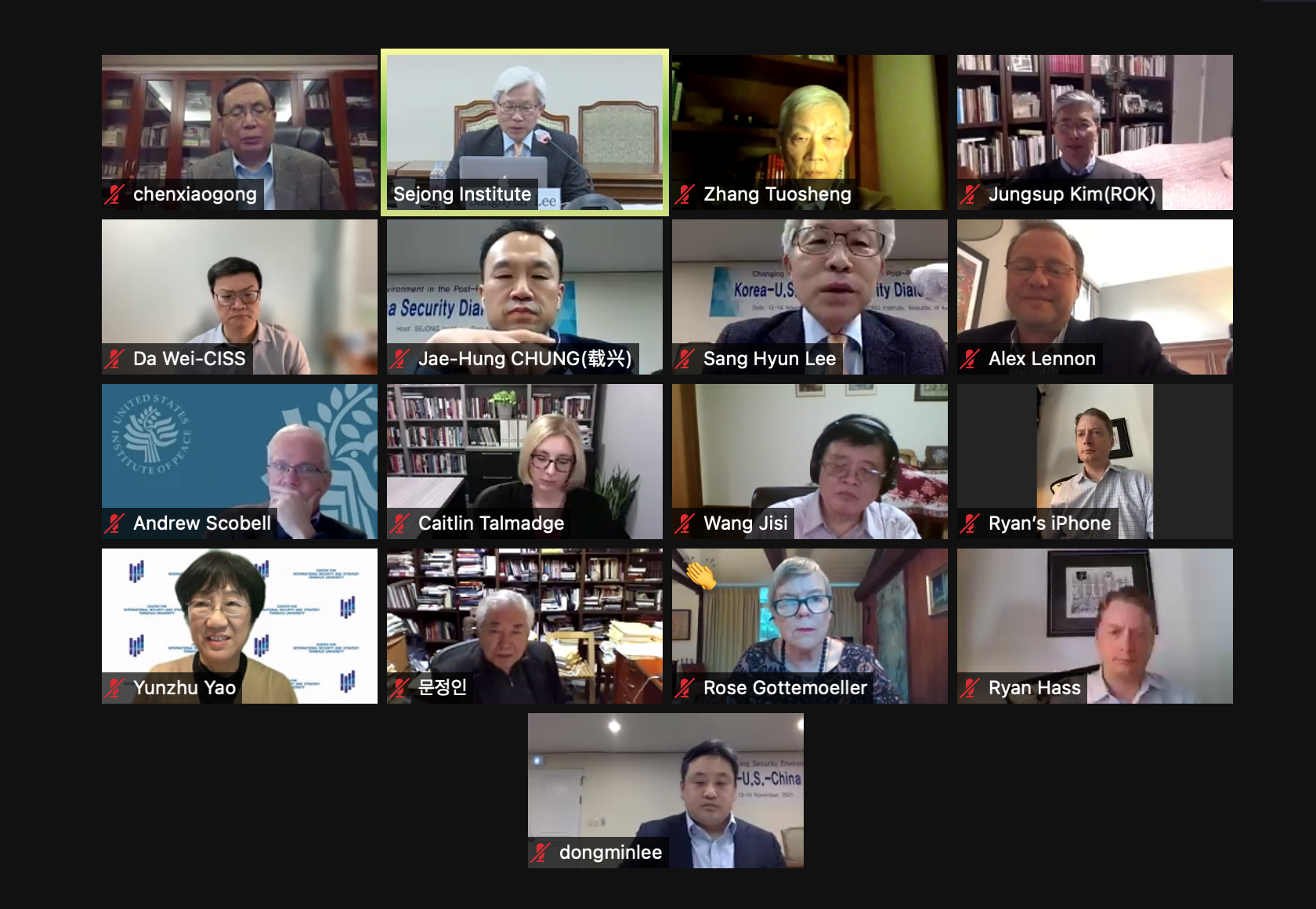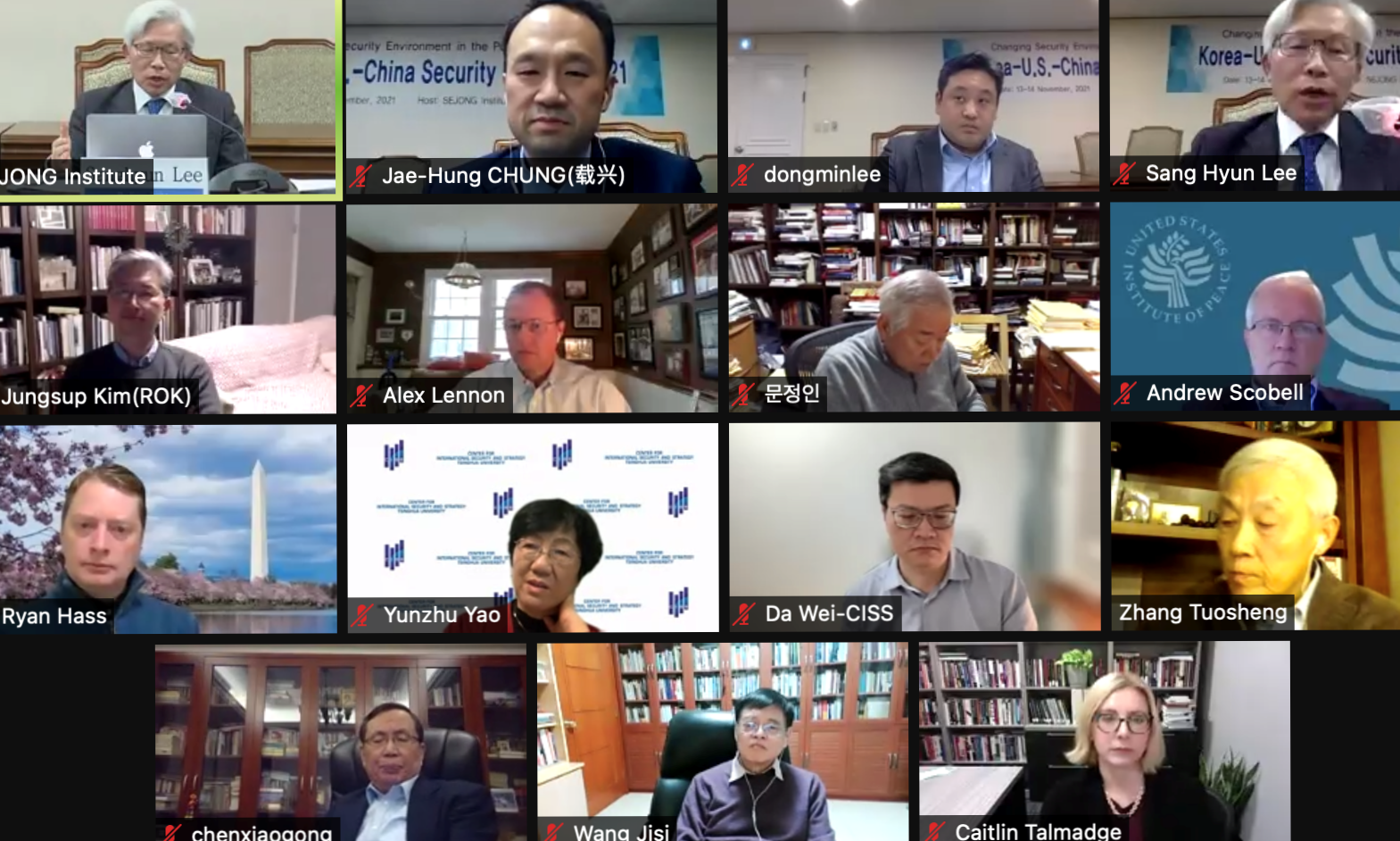On November 13 and 14, 2021, the Center for International Security and Strategy (CISS) of Tsinghua University and the SEJONG Institute jointly organized the Korea-US-China Security Dialogue 2021: US-China Relations in the Post-Pandemic Era.
The virtual conference brought together 15 experts from China, South Korea, and the US. Among the Chinese panelists were Chen Xiaogong, Retired Lieutenant General, PLAAF and Academic Committee Member of CISS; Wang Jisi, President of the Institute of International and Strategic Studies, Peking University and Academic Committee Member of CISS; Yao Yunzhu, Retired Major General, PLA, Director Emeritus of the Center on China-American Defense Relations, Academy of Military Sciences, and Academic Committee Member of CISS; Zhang Tuosheng, Research Fellow at China Foundation for International and Strategic Studies and Academic Committee Member of CISS; and Da Wei, Deputy Director of CISS. Korean participants included Moon Chung-in, Chairman of the SEJONG Institute; Lee Sang Hyun, President of the SEJONG Institute; Kim Jungsub, Vice President of the SEJONG Institute and Former Director-General for Policy Planning at Ministry of Foreign Affairs, ROK; Chung Jaehung, Research Fellow at the SEJONG Institute; and Lee Dongmin, Associate Professor of International Relations, Dankook University. From the US side, those attending were Rose Gottemoeller, Former Deputy Secretary General, NATO and Former Under Secretary for Arms Control and International Security, US State Department; Alexander Lennon, Editor of the Washington Quarterly; Ryan Hass, Senior Fellow at John L. Thornton China Center, Brookings Institution; Catlin Talmadge, Professor of Georgetown University; and Andrew Scobell, Distinguished Fellow at United States Institute of Peace. The panelists engaged in a robust discussion on US-China security relations and the future of the Korean Peninsula and its nuclear issue.

Session I
The seminar was structured in two sessions. Session I, titled “US-China Relations and Nuclear Implications,” featured an exchange of perspectives and suggestions for countermeasures between Chinese and the US experts on issues including the changing security environment in the post-pandemic era, US-China relations and nuclear implications, and the nuclear arms race. Session II was entitled “Future of the Korean Peninsula and the Nuclear Issue,” in which the discussants explored the current situation and possible prospects for the Korean Peninsula, as well as the relevant policies of China, the US, the ROK, and the DPRK on this issue. In the concluding session, the panelists discussed the role of mini-lateral dialogue in managing US-China security relations and finding potential paths for progress on the Korean Peninsula.

Session II
It was noted at the meeting that the nuclear capabilities of China and the US and the direction the Korean Peninsula is heading are particularly steered by the overall relationship between the two countries. As multiple issues are closely woven together in the fabric of the increasingly complex bilateral ties, it is necessary for both sides to proceed pragmatically in enhancing their dialogue at the political and military levels to ensure a fluid information flow and clear signals, avoiding escalation of regional tensions due to miscalculations. Regarding the Korean Peninsula and the nuclear nonproliferation issues, close communications with countries and regions concerned need to be facilitated in order to find solutions on the political level, to seek stability through dialogue and progress through cooperation, and to prevent those issues from escalating into becoming a matter of US-China competition or confrontation. Acknowledging the success of this trilateral security dialogue, the panel expressed the hope that it will be held regularly in the future and, hopefully, as face-to-face meetings when we overcome COVID-19.
